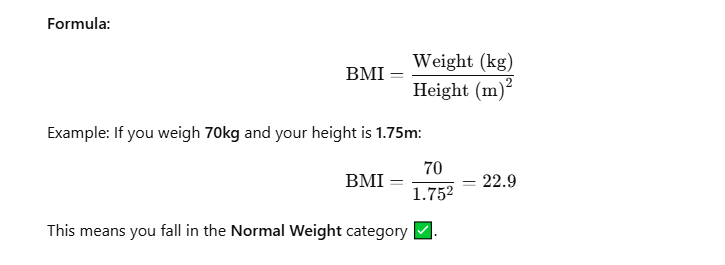Maintaining a healthy weight is essential for overall health, but how do we know if our weight is in the right range? This is where BMI (Body Mass Index) comes in. BMI is a simple and widely used tool that helps determine whether you are underweight, normal weight, overweight, or obese based on your height and weight.
Understanding BMI
BMI stands for Body Mass Index, a numerical value calculated from your weight and height. It is a quick way to assess whether your body weight falls within a healthy range. While it doesn’t measure body fat directly, it is a useful screening tool for potential health risks related to weight.

BMI Categories
According to the World Health Organization (WHO), BMI is categorized as follows:
| BMI Value | Category | Health Risk |
|---|---|---|
| Below 18.5 | Underweight | Malnutrition, osteoporosis, weakened immunity |
| 18.5 – 24.9 | Normal weight | Low risk of weight-related diseases |
| 25 – 29.9 | Overweight | Increased risk of heart disease, diabetes |
| 30 and above | Obese | High risk of heart disease, diabetes, high blood pressure |
Note: BMI is a general guideline. Factors like muscle mass, age, gender, and body composition can affect your health beyond just BMI.
Why BMI is Important
- Health Monitoring: BMI helps identify individuals at risk of health issues due to their weight.
- Early Detection: Being aware of your BMI can motivate lifestyle changes before serious health problems occur.
- Guidance Tool: Healthcare professionals often use BMI alongside other assessments to recommend diet, exercise, or treatment plans.
Limitations of BMI
While BMI is useful, it has some limitations:
- Doesn’t differentiate between muscle and fat
- May misclassify athletes with high muscle mass as overweight or obese
- Less accurate for older adults or children
For a more complete picture of health, consider waist-to-hip ratio, body fat percentage, and other measurements.
How to Improve Your BMI
- Healthy Eating: Focus on balanced meals with vegetables, fruits, lean protein, and whole grains.
- Regular Exercise: Aim for at least 150 minutes of moderate activity weekly.
- Lifestyle Changes: Reduce sugar, alcohol, and sedentary habits.
- Track Your Progress: Use a BMI calculator regularly to monitor changes.
Conclusion
BMI is a simple and effective way to evaluate whether your weight is within a healthy range. While it has some limitations, it’s a great starting point for improving health and preventing weight-related diseases.
If you’re curious about your BMI, try our BMI Calculator and take the first step toward a healthier lifestyle today!
